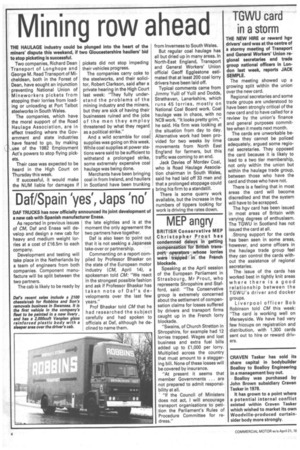Mining row ahead
Page 6

If you've noticed an error in this article please click here to report it so we can fix it.
THE HAULAGE industry could be plunged into the heart of the miners' dispute this weekend, if two Gloucestershire hauliers' bid to stop picketing is successful.
Two companies, Richard Dean Transport of Longhope and George M. Read Transport of Micheldean, both in the Forest of Dean, have sought an injunction preventing National Union of Mineworkers pickets from stopping their lorries from loading or unloading at Port Talbot steelworks in South Wales.
The companies, which have the moral support of the Road Haulage Association, are in effect treading where the Government and state industries have feared to go, by making '—use of the 1982 Employment Act's powers to stop flying pickets.
Their case was expected to be heard in the High Court on Thursday this week.
If successful, it would make the NUM liable for damages if pickets did not stop impeding their vehicles progress.
The companies carry coke to the steelworks, and their solicitor, Robert Clarkson, said after a private hearing in the High Court last week: "They fully understand the problems of the mining industry and the miners, but they are sick of having their businesses ruined and the jobs of the men they employ threatened by what they regard as a political strike." And a wild scramble for coall supplies was going on this week. While coal supplies at power stations were said to be sufficient to withstand a prolonged strike, some extremely expensive coal haulage was being done.
Merchants have been bringing coal in from Ireland, and hauliers in Scotland have been trunking from Inverness to South Wales.
But regular coal haulage has all but dried up in many areas. In North-East England, Transport and General Workers' Union official Geoff Egglestone estimated that at least 200 coal lorry drivers have been laid off.
Typical comments came from Jimmy Yuill of Yuill and Dodds, Strathaven, Lanarkshire, which runs 45 lorries, mostly on National Coal Board work. Coal haulage was in chaos, with no NCB work. "It looks pretty grim," he said. His firm was looking at the situation from day to day. Alternative work had been provided for two weeks by lime movements from North East EngIand for farmers, but this traffic was coming to an end.
Jack Davies of Mordav Coal, who is Road Haulage Association chairman in South Wales, said he had laid off 33 men and that a prolonged stoppage could bring his firm to a standstill.
There is some quarry work available, but the increase in the numbers of tippers looking for work is driving the rates down.




















































































